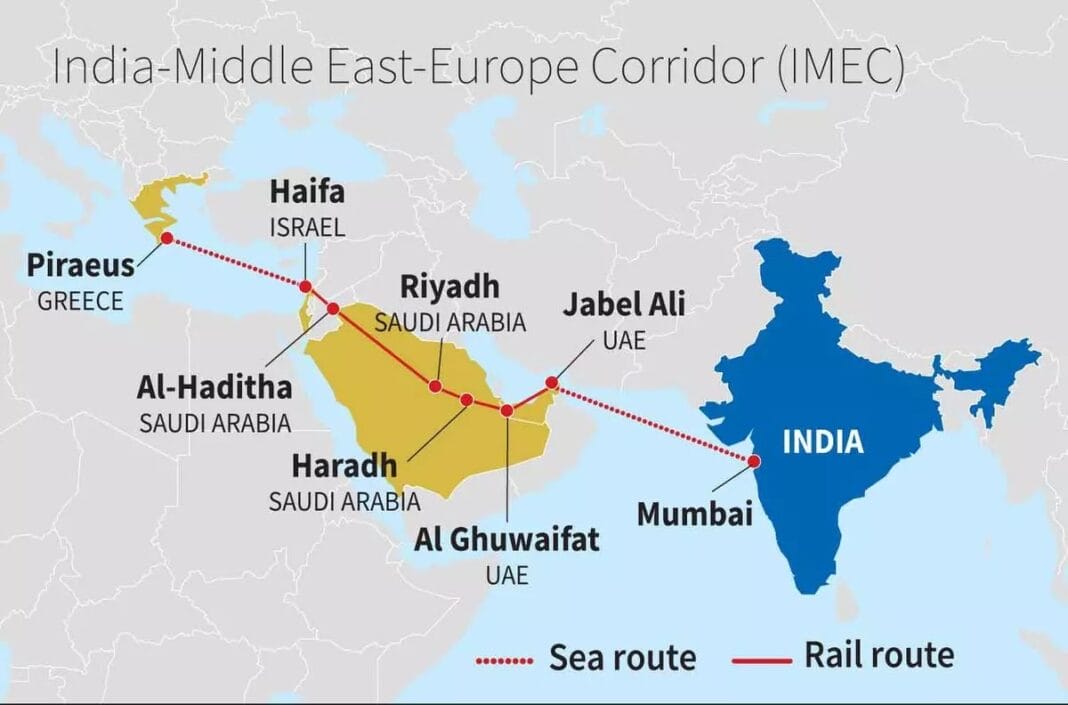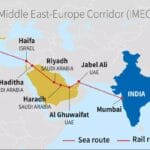Two development initiatives have captured the world’s attention recently, such as the Build Back Better World (B3W) plan and the Memorandum of Understanding (MoU) for the construction of the India-Middle East-Europe Economic Corridor (IMEC) signed at the G-20 summit. These ambitious projects hold great promise but also offer valuable lessons about the complexities of turning lofty commitments into concrete actions. B3W was envisioned as a market-led infrastructure partnership led by major democracies at the G-7 summit in 2021. The main aim was to help narrow the developing world’s $14 trillion infrastructure need. After two years of initiating the project, the India-Middle East-Europe Economic Corridor (IMEC), aiming at connecting India with the Middle East and Europe, has become the talk of the town at the end of the G-20 summit held in India.
Initially, the B3W and IMEC plans reflect competition with the Chinese Belt and Road Initiative (BRI), mirroring more of a geopolitical strategy rather than a geo-economic project. Meanwhile, China welcomes the IMEC initiative so long it doesn’t become a “geopolitical tool”. The fate of this project depends on its practical implementation, no matter how ambitious the project might be. The IMEC MoU signed at G-20 by India, Germany, France, Italy, Saudi Arabia, the European Union, and the United Arab Emirates has missed out several key connections and regional stakeholders. If the plan fails to translate into concrete actions, it risks following the same uncertain path as the B3W plan.
While the G-20’s trade route project holds immense promise, its complexity arises from multiple factors ranging from geopolitical considerations to financial and security factors. The parties involved may face significant challenges in terms of expertise and capabilities required to successfully build such an extensive transport network, particularly in the complex security and political landscape of the Middle East having intricate geopolitical dynamics and regional conflicts.
The joint venture of the IMEC project comprises two distinct corridors: an eastern corridor linking India to the Gulf Arab states and a northern corridor connecting the Gulf states to Europe. Beyond trade opportunities, this route will aim potentially to facilitate electricity and digital connectivity while also accommodating pipelines for the export of clean energy—an ambitious approach to sustainable energy solutions. The Memorandum lacks tangible projects, investments, and policy implementations while the success of international agreements often hinges on the sustained dedication of participating countries.
Moreover, the Middle East has a complex historical relationship with the United States, characterized by periods of cooperation and distrust, and historical precedents should consider the credibility of such an ambitious project. It is not the first time that Washington has made pledges of this nature to various countries. Past commitments have sometimes translated into concrete actions, raising questions about the credibility of such promises. This historical context can contribute to an environment of skepticism, potentially impacting the collaboration and cooperation.
Regarding the route of the IMEC project, the potential opposition from countries in the region, particularly Egypt, due to bypassing the Suez Canal, a strategic vital waterway, has a basis of economic and geopolitical considerations. Any project that seeks to divert significant trade away from the Suez Canal may face opposition from Egypt and other countries in the region. The success and acceptance of the IMEC project will depend on careful diplomacy, negotiations, and addressing the concerns of nations affected by the potential shift in trade routes. It underscores the complexities of large-scale infrastructure initiatives in regions with sensitive geopolitical considerations.
Furthermore, the President of Turkey has expressed opposition to the project, asserting that there can be no corridor without Turkey’s involvement. He emphasized Turkey’s significance as a production and trade hub, underscoring the importance of its geographic location as a pivotal route for east-to-west traffic.
Besides, India is adding to its burden by actively participating in various multilateral forums. The challenge lies in balancing diverse interests, from economic development to regional security, and meeting heightened international expectations. Consistency in foreign policy and adherence to international norms are imperative for maintaining a positive global image, as any policy shifts can raise doubts about India’s commitment to global cooperation. Also, financial and human resource constraints may complicate engagements, and coordinating across international commitments can strain diplomatic resources. Geopolitical pressures in specific regions could also hinder India’s effectiveness in global forums. India must prioritize engagements, invest strategically in diplomatic resources, and focus on areas where it can make a substantial impact while ensuring open and transparent communication of its objectives and actions. The real work lies ahead, from paper to progress of the IMEC. For successful commitments into actions, transparency, and accountability are paramount which seems lack in so far announced project. It is more accurate to say that the execution of this project may face substantial hurdles. While the project is promising, success hinges on its implementation and how these hurdles are tackled rather than dismissing it outrightly. The B3W plan’s lack of detailed implementation strategies left room for skepticism, whereas the G-20 MoU may face the similar fate. The global community will be watching closely to see if this modern-day spice route can live up to its potential and reshape the geopolitics of connectivity or if it will share the same destiny as B3W.






